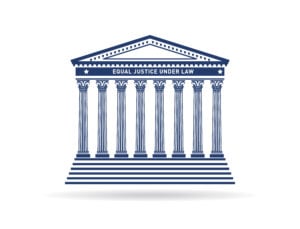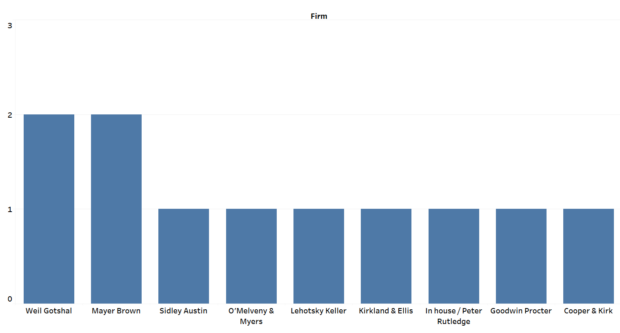[ad_1]
 Less than one month ago, the Supreme Court released its decision in the case of Dobbs v. Jackson Women’s Health overturning 50 years of precedent protecting the right to an abortion.
Less than one month ago, the Supreme Court released its decision in the case of Dobbs v. Jackson Women’s Health overturning 50 years of precedent protecting the right to an abortion.
One hundred thirty-three amicus curiae filed friend of the Court briefs on behalf of both sides of this issue. This represents the most amicus briefs filed in one case since the Obergefell v. Hodges decision in the 2014 Term and one of the cases with the most amicus briefs filed in the history of the Court.
These briefs typically deal with policy — providing alternative perspectives to the justices and to show the views of various constituencies. They are meant to help convince the justices to vote one way or another or to push the law in a given direction.
The amicus briefs in Dobbs conveyed more emotions than are often the case in such filings. You can find such emotion on both sides of the aisle.
On the pro-life side the Becket Fund for Religious Liberty’s brief provides a good example. This brief begins, “Abortion haunts the law. The Court’s abortion cases — and the Roe/Casey framework in particular — neither fit within the bounds of the Constitution’s design nor help to resolve in any meaningful way the underlying societal conflict over abortion. The most obvious symptom of this malfunctioning legal structure is the Court’s stunted and divisive abortion jurisprudence itself.”
On the other side many pro-choice groups had equally strong feelings about this issue. One such brief by Equal Protection Constitutional Law Scholars began, “The fundamental right at stake in this case matters to millions of Americans — not only to those who choose to end their pregnancies, but also to those who make life decisions secure in the understanding that they could make that choice if necessary. One in four women of child-bearing age in this country will have an abortion.”
With all of this participation, the vote in Dobbs still came down predictably to a 6-3 vote with the conservative justices in the majority. Even with this predictability though, the justices cited 27 amicus briefs between the various opinions in the case. Thus, the impact from amici could be felt notwithstanding the predictable decision. In some of the other cases this term, amicus briefs appear to sway or inform the authoring justices’ positions.
An example of an informative amici came in the City of Austin v. Reagan National Advertising. Here Justice Thomas’ dissenting opinion noted, “…a city could define ‘an o[n]-premise[s] sign as any sign within 500 feet of a building,’ 937 F. 3d, at 732, or a sign that is installed by ‘a business . . . licensed to occupy . . . the premises where the sign is located,’ Brief for Summus Outdoor as Amicus Curiae 10.”
Amicus briefs have also been used this term to confirm a justice’s position on an issue or to present supporting statistics. In terms of posturing, in Dobbs Justice Alito cited the fact that, “Neither respondents nor the Solicitor General disputes the fact that by 1868 the vast majority of States criminalized abortion at all stages of pregnancy. See Brief for Petitioners 12–13; see also Brief for American Historical Association et al. as Amici Curiae.” As for a brief supporting the point advocated in the opinion with statistics, Justice Thomas opinion in New York State Rifle & Pistol relays that, “According to survey data, defensive firearm use occurs up to 2.5 million times per year. Brief for Law Enforcement Groups et al. as Amici Curiae.”
Amicus briefs played large roles in many cases this term. 887 total briefs were filed on the merits in these cases. While this might sound like a lot, more briefs were filed in the previous term (940). In fact, even with all of the highly politicized cases this term, more amicus briefs were filed on the merits in three terms prior to this one since 2010. The height of these filings was in 2012 when groups filed 1,003 amicus briefs on the merits. Cases like Fisher v. University of Texas at Austin, Shelby County v. Holder, Hollingsworth v. Perry, and United States v. Windsor were decided in 2012. Fisher alone accumulated 91 merits amicus briefs.
The following graph compares the number of merits amicus filings in the three cases with the most briefs for each term from 2014 to the present.
Dobbs had the second most amicus briefs since 2014 after the 143 filed in Obergefell. NY Rifle had the sixth most briefs from this period and the 57 amicus briefs filed in Kennedy v. Bremerton put this case in the middle of this list.
The filings this term were quite top heavy. The cases with a large number of filings were well above the median value of filings this term with 133 briefs filed in Dobbs, 82 in NY Rifle, 57 in Kennedy, 45 in Carson, and 32 in West Virginia v. EPA. Contrastingly three cases had only one amicus brief and five others had only three.
One of the biggest questions each term is which groups filed the most amicus briefs. Looking at only briefs filed in argued cases and not including emergency applications (as in the NFIB case) with groups that filed at least three amicus briefs on the merits this term, several groups came out on top.
The United States set the high-water mark for briefs filed as it routinely does every term. After the United States the largest number of filings came from the Constitutional Accountability Center, the ACLU, and the Chamber of Commerce of the United States. Many of the groups that filed a large number of briefs this term have strong ideological underpinnings. Groups like the Constitutional Accountability Center fall to the left while Americans for Prosperity Foundation and others fall to the right.
Since the Court is right leaning at the moment, an informed supposition would be that groups on the right will be more successful than groups on the left. One simple way to measure this hypothesis is by measuring which groups have been associated with winning parties on the merits.
The Constitutional Accountability Center, for instance, filed briefs in 13 cases this term. 12 of those cases came back with a clear winner (United States v. Texas came back as a DIG). The Center was on the winning side in four cases and the losing side in eight cases. This record aligns with the prediction.
Five of the seven cases where Americans for Prosperity filed briefs came back with clear outcomes for one party. This organization came out on top in four of these five decisions. The Becket Fund for Religious Liberty is another right leaning group that filed a number of briefs this term. Of the six amicus briefs filed by Becket on the merits, five came in cases with clear outcomes. Becket was on the winning side in all five cases.
One other interesting point of note is following who writes and files briefs for these groups. Some choose to author and produce all of their briefs in-house. This was the case with Americans for Prosperity Foundation this term with all seven amicus briefs authored in-house. On the other side of the coin, several groups prefer outside counsel to author their briefs. The United States Chamber of Commerce is one such group. The graph below shows the authoring firm of record on each of the 11 amicus briefs filed by the Chamber. None of the Chamber’s briefs had in-house counsel of record. The only brief that came close was in ZF Automotive where the counsel of record was Peter Rutledge, Dean of University of Georgia School of Law.
This term showcased the ideological divide between amici on the left and on the right. With several heavily followed cases, those with many amicus briefs created three tiers of amicus filings by quantity in a case. There were the cases with large, medium, and low levels of filings. Both of these trends can be expected in the future.
With other heavily anticipated cases, there will inevitably be a large number of filings at the top and these filings will almost definitely be dominated by groups with stronger ideological valences.
We should also continue to see the rightward skewing groups come out on top while the groups pushing farther to the left will most likely be impactful in dissent — at least in the cases the public is most closely following.
Read more at Empirical SCOTUS…
Adam Feldman runs the litigation consulting company Optimized Legal Solutions LLC. For more information write Adam at adam@feldmannet.com. Find him on Twitter: @AdamSFeldman.
[ad_2]








